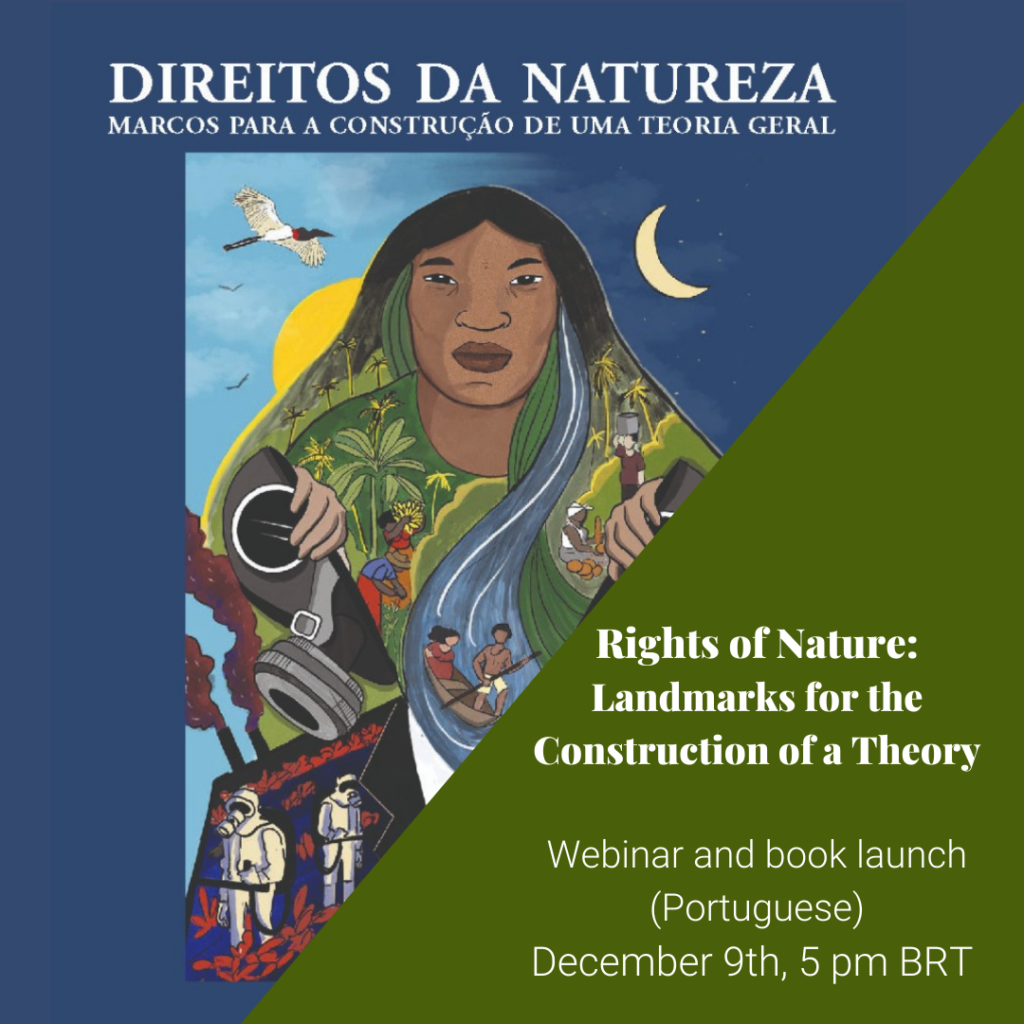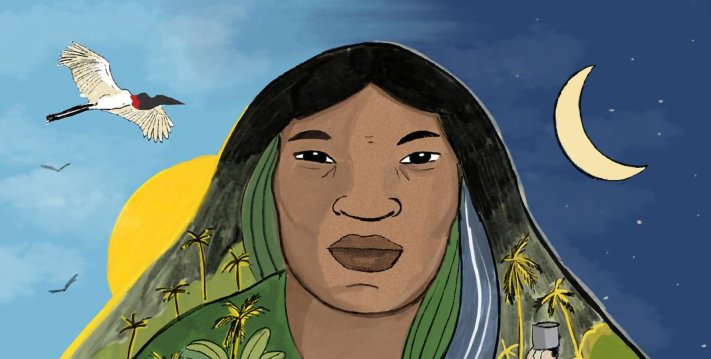By: Anna Maria Cárcamo, Legal Advisor Latin America and the Brazilian National Articulation for the Rights of Nature – Mother Earth
Português translation below | Tradução de português abaixo
Rights of Nature is a global movement which proposes a profound change in legal frameworks and society as a whole, from an anthropocentric to an ecocentric vision. This change defends a more harmonious relational perspective between people and Nature; a perspective that breaks with the utilitarian model in which humans consider Nature to be an appropriate resource and in which human and non-human beings recognize themselves as members of the same planetary community.
With this perspective, the Brazilian National Articulation for the Rights of Nature – Mother Earth, with support from the National Observatory of Social and Environmental Justice Luciano Mendes de Almeida (OLMA), launches the book “Os Direitos da Natureza: Marcos para a Construção de uma Teoria Geral” (The Rights of Nature: Landmarks for Construction of a General Theory) with participation of authors and jurists including Monti Aguirre, Latin America Coordinator, and Anna Maria Cárcamo, Latin America Legal Advisor, from International Rivers, and partners from the Indigenist Missionary Council (CIMI), the Federal Public Ministry (MPF), from the Public Defender’s Office of Pará, Dom Helder Câmara School of Law, the Catholic University of Pernambuco, the Harmony with Nature Platform United Nations and the NGO MAPAS.
The book begins outlining different perspectives, principles and emerging paradigms, for the construction of a General Theory of Rights of Nature, based on ecocentric ethics and on the interdependence and complementarity between all beings that integrate Nature. The following chapters bring a collection of case studies for a better practical understanding of the Rights of Nature, from international and domestic examples, such as the case of the Whanganui River in New Zealand, the recognition of the legal personality of the Colombian Amazon and the municipal constitutions from Paudalho, Bonito and Florianópolis, in Brazil. These are emblematic cases that represent the advance of the concept of Nature as a subject of rights, in the legal and sociological universe.
More information
- The book launch will be on December 9th, 5 pm BRT, and will be live-streamed on International Rivers’ Facebook in Portuguese.
- The entire book is available online for free in Portuguese here
Os Direitos da Natureza nasceram de um movimento global desde a promulgação da Constituição Federal do Equador em 2008 e propõem uma mudança paradigmática para as ciências jurídicas e para a sociedade como um todo. Esta mudança paradigmática propõe a transição de uma visão antropocêntrica para uma ecocêntrica. Esta mudança defende uma perspectiva relacional mais harmônica entre as pessoas e a Natureza; uma perspectiva que rompe com o modelo utilitarista no qual os humanos consideram a Natureza mero recurso apropriável e na qual os seres humanos e não humanos se reconhecem como membros de uma mesma comunidade Planetária.
Com essa perspectiva, a Articulação Nacional pelos Direitos da Natureza – Mãe Terra, com apoio do Observatório Nacional de Justiça Socioambiental Luciano Mendes de Almeida (OLMA), lança o livro “Direitos da Natureza: marcos para a construção de uma teoria geral”, com participação de autores e juristas do Conselho Indigenista Missionário (CIMI), Ministério Público Federal (MPF), da Defensoria Pública do Pará, de Escola de Direito Dom Helder Câmara, da Universidade Católica de Pernambuco, da ONG International Rivers, da Plataforma Harmony with Nature da Organização das Nações Unidas e da OSCIP MAPAS.
O livro se inicia com um enquadramento, delineando distintas perspectivas, princípios e paradigmas emergentes, para a construção de uma Teoria Geral Direitos da Natureza, se pautando na ética ecocêntrica e na interdependência e complementaridade entre todos os seres que integram a Natureza. A seguir, traz uma coletânea de estudos de caso para a melhor compreensão prática dos Direitos da Natureza, a partir de exemplos internacionais e domésticos, como o caso do Rio Whanganui na Nova Zelândia, do reconhecimento da personalidade jurídica da Amazônia colombiana e as leis orgânicas de Paudalho, Bonito e Florianópolis, no Brasil. São casos emblemáticos que representam efetivamente o avanço da concepção de Natureza enquanto sujeito de direitos, no universo jurídico e sociológico.

Mais Informações
- O lançamento do livro será dia 9 de dezembro, às 17:00, Brasília, e será transmitido no facebook da International Rivers.
- O livro está disponível gratuitamente através do seguinte link.
Cover of the Rights of Nature Book | Illustration by Matheus Ribs

